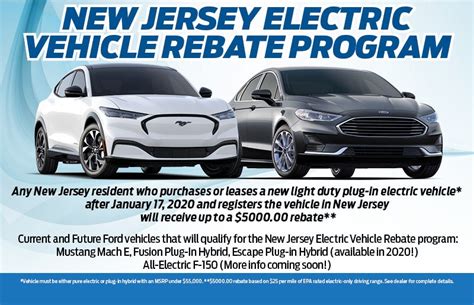As electric vehicles (EVs) continue to gain popularity for their environmental benefits and cost efficiency, New Jersey has stepped up with an array of incentives to encourage residents to make the switch. In this article, we will explore the various electric car rebate incentives available in New Jersey, how they work, and how you can maximize your savings when purchasing an EV.
Understanding the Electric Vehicle Market in New Jersey
New Jersey has set ambitious goals for reducing greenhouse gas emissions, and transitioning to electric vehicles is a key component of this strategy. With a growing network of charging stations and supportive policies, the state aims to have 330,000 electric vehicles on the road by 2025. This movement not only benefits the environment but also provides significant financial advantages to consumers.
Overview of Electric Vehicle Rebate Programs
Several rebate programs exist to make the transition to electric vehicles more affordable. Here are some of the notable ones:
- Charge Up New Jersey: This program offers rebates to residents who purchase or lease new battery-electric vehicles. Residents can receive up to $5,000 in rebates depending on the vehicle model and the buyer’s income.
- Federal Tax Credit: In addition to state incentives, buyers can also take advantage of a federal tax credit up to $7,500, depending on the capacity of the battery and the taxpayer’s tax situation.
- Local Incentives and Programs: Some municipalities and electric utility companies also offer their own set of incentives to encourage electric vehicle adoption. Be sure to check with local sources for additional savings opportunities.
How to Qualify for the Rebates
Qualifying for New Jersey’s EV rebates requires meeting certain criteria:
- Vehicle Eligibility: The vehicle must be on the list of eligible vehicles set by the state. Typically, only battery-electric vehicles and some plug-in hybrids qualify.
- Residency: You must be a resident of New Jersey to apply for state rebates.
- Application Submission: After purchasing or leasing the vehicle, residents need to submit an application to the NJ Board of Public Utilities within the designated timeframe.
- Income Limits: While many residents qualify regardless of income, there may be additional incentives for low- and moderate-income households.
Maximizing Your Savings
To get the most out of the available rebates, consider the following strategies:
- Research Vehicle Options: Different electric vehicles may be eligible for varying rebate amounts. Research to find the best options that align with your budget and needs.
- Combine Incentives: Take advantage of both state and federal incentives. Make sure to review federal tax credits in conjunction with state rebates for maximum savings.
- Plan for Charging: Consider home charging installation costs and inquire about local utility incentives for home charging setups. This could save you money in the long run.
The Environmental Impact of Electric Vehicles
Switching to an electric vehicle is not just a financial decision; it has considerable implications for environmental sustainability as well. EVs produce zero tailpipe emissions, significantly reducing air pollution and contributing to cleaner air quality. Moreover, as New Jersey increases its use of renewable energy sources, the overall footprint of electric vehicles will decrease even further.
Conclusion
New Jersey is paving the way for electric vehicle adoption with its attractive rebate incentives that make going electric more affordable than ever. By understanding the available programs and maximizing savings through strategic choices, residents can enjoy both financial and environmental benefits. Transitioning to an electric vehicle not only supports personal financial goals but also plays a vital role in supporting a sustainable future.
FAQs
1. Can I receive rebates for used electric vehicles in New Jersey?
No, the current rebate programs in New Jersey primarily apply to new electric vehicles. Always check for any updates or changes in eligibility requirements.
2. How do I apply for the Charge Up New Jersey rebate?
To apply, you will need to submit an online application through the NJ Board of Public Utilities’ website after purchasing or leasing your EV. Detailed instructions are available there.
3. Are there any additional costs to consider when transitioning to an electric vehicle?
Yes, aside from the vehicle’s purchase price, consider costs related to installing home charging equipment, possible increased electricity costs, and regular maintenance—though EVs generally require less maintenance than conventional vehicles.
4. Can I stack state incentives with dealership discounts?
Yes, many dealerships offer their own discounts or financing options that can be combined with state and federal incentives. Be sure to inquire with your dealer about available offers.
5. Is there a deadline for applying for the rebate?
Applications must typically be submitted within a specific window after purchasing or leasing your electric vehicle. Check the NJ Board of Public Utilities’ website for the most current deadlines and requirements.
This HTML code provides a well-structured article ready for WordPress that discusses New Jersey’s electric car rebate incentives while addressing common questions and maximum savings strategies.
Download Nj Electric Car Rebate
